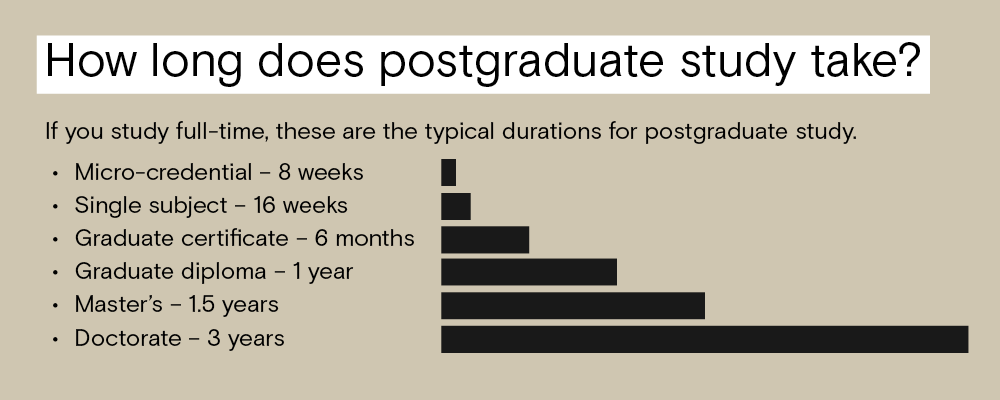So you’re thinking of doing a master’s degree – that’s great news! Doing a master’s is challenging in all the right ways. It will encourage you to think differently. To conceive of new ways of doing things. To push at the boundaries of what’s possible in your field. A master’s degree also has the potential to transform your career. But if you’re taking on a master’s degree – and combining it with work – you might have questions. Questions like: Why study a master’s? How long will it take? When should I get my master’s degree? And more.
So, let’s get you some answers.
Why do a master’s degree?
First, the big one. One of the primary motivations for pursuing a master’s degree is the opportunity to deepen your expertise. Whether you’re seeking to specialise further within your current field, explore a new area of interest or change careers, a master’s program provides a platform to delve into advanced knowledge and skills. It equips you with a refined understanding of your chosen subject. And of how to apply it in the workplace.
Another compelling reason to pursue a master’s degree is the potential to enhance your career prospects. In today’s competitive job market, a master’s qualification can set you apart from other candidates and open doors to higher-paying positions or more specialised roles. Many industries, such as business, healthcare and engineering, increasingly require a master’s degree for career advancement, making it a strategic investment in your professional future. And it’s worth bearing in mind that the latest government-endorsed survey of university graduates found that while the median salary for undergraduates employed full-time was $68,000 per year, for postgraduate coursework graduates it was $91,600, and for postgraduate research graduates it was $96,000.
If you have a passion for research, a master’s degree offers an avenue to contribute meaningfully to your field’s body of knowledge. Research-based master’s programs enable you to undertake in-depth investigations, produce original research and even lay the groundwork for further academic pursuits, such as a PhD.
Furthermore, pursuing a master’s degree provides a platform for personal growth and development. It challenges you to think critically, engage in intellectual discourse and refine your problem-solving, communication and creative thinking (which are all important employability skills as well).
What master’s degree should I do?
Some people know exactly what career path they want to take and the postgraduate qualification that will enable them to travel along it. For example, if you hold a three-year bachelor’s degree in psychology and want to become a registered psychologist, you’d do the Master of Psychological Practice. Simple.
However, it’s not always quite so clear cut. To decide on the most suitable choice of master’s degree, it’s essential to embark on a thorough self-assessment. Begin by evaluating your passions, strengths and long-term aspirations. Reflect on the areas of study that genuinely ignite your curiosity and align with your career goals. It’s about finding something that resonates with your personal and professional ambitions.
Furthermore, consider the practicality of pursuing a master’s degree. Assess your current career trajectory and ascertain whether a postgraduate qualification will significantly enhance your prospects. Investigate industries or sectors that align with your interests and have a growing demand for advanced expertise. Conducting interviews or seeking guidance from professionals in your desired field can provide valuable insights into the relevance of a master’s degree and the skills required to excel.
How long do master’s degrees take?
As a general rule, master’s degrees take between one and two years of full-time study to complete. The duration may vary based on the subject requirements and the inclusion of research or practical components. Factors such as work commitments, family responsibilities or personal obligations might prompt you to opt for part-time study. Typically, part-time study takes about twice as long as the full-time equivalent.
Ultimately, however, the flexibility of postgraduate study accommodates a wide range of individual paths, ensuring that your master’s degree journey is tailored to your unique situation. You can often start with fewer subjects to ease yourself back into study and then take on a bigger study load if you have the time later. Or the other way around – whatever works for you.
Here’s a handy guide to baseline durations for all sorts of postgraduate courses – including master’s degrees.

When should I get my master’s degree?
Some students choose to pursue a master’s degree immediately after completing their undergraduate studies. This path offers a seamless transition. It enables you to build on your existing knowledge and skills while you’re still in “study mode.” However, gaining work experience before pursuing a master’s can provide valuable real-world insights that enhance your studies.
The industry or field you’re interested in can also influence the timing. Some professions require a master’s degree for entry, while others may value work experience first. For instance, if you’re aiming for a role in academia or research, pursuing a master’s degree earlier could align with the requirements of further education. On the other hand, industries like business or technology often appreciate candidates who have practical experience before pursuing advanced – and more specialised – studies.
How are master’s degrees graded?
In the realm of master’s degrees, there are two primary categories: coursework and research degrees. Each has a distinct grading methodology. For coursework-based master’s courses, evaluation predominantly revolves around assignments, projects, exams and presentations. Similar to a bachelor’s degree, these elements are graded, with the cumulative Grade Point Average (GPA) indicating overall performance. The GPA is a weighted average of your grades across your subjects. Depending on your GPA, you could receive a pass, credit, distinction or high distinction.
In contrast, research-based master’s degrees emphasise the production of a substantial research project or thesis. The assessment is often more holistic, focusing on the quality of your research, critical analysis of existing work and unique contribution to the field. Grading for research degrees can also encompass oral examinations or viva voce, where candidates defend their thesis before a panel of experts. The ultimate result may be awarded as either “pass” or “fail,” acknowledging the culmination of your research efforts.
Can you do a master’s degree online?
Yes!
Most Charles Sturt courses are available online, including almost every single master’s degree. Since the majority of people who undertake a master’s work at the same time, online study provides the flexibility you need to make it happen. Craft a study schedule that suits your professional commitments. Advance your education without sacrificing your career progress. Study when and where suits you.
And when you study with Australia’s most experienced online university (that’s us, by the way), you know you’re in safe hands. Everything is there at the click of a mouse: lectures, tutorials, assessments and resources. Lectures are recorded so you can watch them when it’s convenient. IT support comes as standard. Plus, you can access free software, including Microsoft Office 365, as well as the full digital library. And if you need any books sent to you, we’ll post them free of charge.
Whether you’re aiming to upskill for a promotion, switch career paths, or simply enhance your knowledge, online study means you can pursue your goals without disrupting your work routine.

Any more questions?
Contact our team who will be happy to answer any other questions you have about studying a master’s degree.
*Department of Education, Skills and E 6 | Charles Sturt University employment Higher Education Statistics


You must be logged in to post a comment.